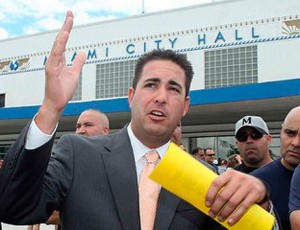Fully recovered from a financial crisis during the late 2000s, Miami commissioners are finally restoring the pay and benefits they unilaterally stripped from their employees in order to balance their books — and giving budget crunchers heartburn in the process.
Taking into consideration a new police union contract that could be awarded Thursday, Miami’s finance staff estimates that the city is on pace to spend about $100 million more than it brings in over the next five years. Union leaders believe those projections are akin to scare tactics, but city manager Daniel Alfonso says at its current rate of spending the city will have to raise taxes, cut non-employee spending, or dip deeply into the city’s rainy day funds in just a few years.
“Something will have to be done unless we’re absolutely wrong about our revenue projections,” he said in an interview.
The increasing expenses, Alfonso says, are due to the city’s recently approved collective bargaining agreements, which are negotiated by his staff, city commissioners and Mayor Tomás Regalado. A few months ago, the city approved a new fire union contract that afforded some members raises worth close to 30 percent in an attempt to restore imposed cuts. The Fraternal Order of Police contract ratified by the union Tuesday night will cost the city an estimated $40 million through 2018 and increase payroll by 10 percent this year, according to city documents.
City projections were enough to lead Miami’s finance committee to recommend that commissioners reject the police contract when they meet Thursday. Part of the concern is that Miami could be repeating some of its past mistakes, when overly generous union contracts collided with an implosion of the real estate market, nearly bankrupting the city.
“Our No. 1 responsibility on the finance committee is to make sure we don’t go over another fiscal cliff with our eyes closed,” said Eric Zichella, a committee member.
But Miami’s unions say Alfonso’s warnings — made as commissioners push to expand the city’s police force and recruit new officers with the lure of improved compensation — are alarmist and intended to tamp down their pay.
Financially, the city, with a general fund around $640 million, is in its best financial shape in years. Credit agencies continue to improve Miami’s bond ratings. And every year, it seems, the city ends with millions in unspent, surplus dollars — enough to distribute millions among elected officials in recent months to spend on brick-and-mortar projects of their choosing.
“The ratification of this contract still leaves the city of Miami Police Department below the pay and benefits of our neighboring agencies such as Miami Beach and Miami-Dade,” President Lt. Javier Ortiz said. “They ‘find’ $20 million every year.”
One factor that should keep the city from falling into another crisis even if real estate values plummet like they did in 2008 is a recession-driven decision to cap employee pensions at $100,000. With that rule, the ballooning pension obligations that threatened to swallow 20 percent of the city’s budget in 2010 shouldn’t recur. The only caveat is that the pension cap is the subject of an open Florida Supreme Court case that has yet to be ruled on 13 months after oral arguments.
“This [contract] does not make us whole, especially when it comes to retirement,” Ortiz said. “This is a safety net while we wait to see what the Florida Supreme Court rules.”


